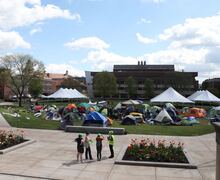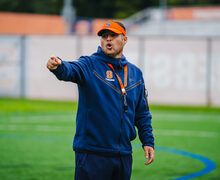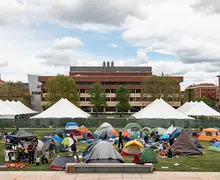Students describe COVID-19 testing delays, gaps in SU’s contact tracing
Emily Steinberger | Photo Editor
The facility that processes SU's COVID-19 tests takes much longer now because it also processes tests that aren't from the university.
The Daily Orange is a nonprofit newsroom that receives no funding from Syracuse University. Consider donating today to support our mission.
Quinn Schmidt never heard from a Syracuse University contact tracer.
After one of his friends tested positive for the coronavirus, Schmidt, a sophomore public relations major, immediately contacted SU’s COVID-19 hotline to see what he should do next. After explaining that he had been around his friend only the night before, the employee on the hotline told him he could still go to class and see his friends.
“That just didn’t seem right to me just because I was in such close contact with somebody who tested positive,” Schmidt said. “They were kind of apathetic toward what I was going through.”
SU announced Nov. 11 that it would transition to online learning for the remainder of the fall semester amid a rise in COVID-19 cases on campus and across Onondaga County. Five days later, the university reported a record of 700 students in quarantine.
SU confirmed 280 active coronavirus cases among students and employees in central New York and 586 students in quarantine as of Wednesday evening.
While SU’s COVID-19 office tries to contact all students in isolation or quarantine daily, the rising cases have made doing so difficult, said David Larsen, an associate professor of public health who served on SU’s Public Health and Emergency Management subcommittee.
“Ideally, we communicate with everyone in quarantine or isolation every day,” Larsen said. “That hasn’t happened over the last couple weeks because we’ve had thousands of students in quarantine. There’s not enough bodies in the COVID office to call every single person and still do the contact tracing.”
At the beginning of the semester, the facility that processed SU’s COVID-19 tests was able to process tests overnight, Larsen said. Now, because the facility processes tests beyond just SU’s, test results have been slower to come back.
“That process has been too slow this semester,” Larsen said. “It is frustrating for me to watch it, and it is frustrating for it to happen.”
That just didn’t seem right to me just because I was in such close contact with somebody who tested positive. They were kind of apathetic toward what I was going through.Quinn Schmidt, SU sophomore
Larsen also attributed some of the new cases to an increase in off-campus parties and to the popular restaurant Margaritas Mexican Cantina, which recently confirmed 19 cases of the virus among its employees.
Despite SU’s extensive COVID-19 response plan, several students told The Daily Orange that they were never contacted by the university after their friends tested positive for the coronavirus, leaving them frustrated and uncertain about what to do next.
Mia Miele, a freshman in the College of Arts and Sciences, received a call from SU asking her to quarantine in the Sheraton Syracuse University Hotel after her friend tested positive for COVID-19.
After spending one night at the Sheraton, Miele was told by an employee from the COVID-19 office she could complete her 14-day quarantine at her family’s second house nearby. She said she later got tested for COVID-19 on her own and did not hear from the university again until her quarantine period was over.
“I got a text like three days ago saying ‘SU is here to help,’ but SU hasn’t called to check in to see I have symptoms or anything like that,” Miele said. “Once I was off campus, they didn’t really ask me anything.”
Four hours after he initially called the Barnes Center at The Arch, Schmidt spoke with a nurse. While he was able to make an appointment to receive a rapid test the next day, other people he knew who had also been in contact with students exposed to COVID-19 didn’t qualify, he said.
“Out of my four friends that were right there, I was the only one who got an appointment within 48 hours,” Schmidt said. “The rest of them had to wait three, four days to get tested, and once they did get tested, they didn’t even get a rapid test.”

SU announced Nov. 11 that it would transition to online learning for the remainder of the fall semester amid a rise in COVID-19 cases on campus and across Onondaga County. Emily Steinberger | Photo Editor
Larsen said SU reserves rapid tests for students who are “highly likely to be infected.”
“It shouldn’t change behavior whether you get a rapid test or you wait three or four days to get a test,” Larsen said. “If you are exposed, you should still be in quarantine.”
Nicole Salpini, a senior marketing and real estate major who is on SU’s figure skating team, said one of her teammates tested positive for COVID-19 on Nov. 1.
Salpini went into quarantine at the Sheraton. But after receiving a negative test result from a rapid test, an SU employee told her she wasn’t even supposed to be there and that she had never technically been exposed to the coronavirus.
“No one had any answers,” Salpini said. “There was no protocol. Everyone had a different idea of what to do.”
Miele, like other students, said SU’s testing and quarantine protocol was unnecessarily stressful — characterized often by miscommunication or conflicting guidance.
“It caused me a lot of stress,” Miele said.
Sydney Schroeder, a sophomore studying English and public relations, said that the lack of communication from SU throughout her quarantine has been aggravating. Schroeder, who went into quarantine after a member of her sorority tested positive, said that she often received updates from her sorority sisters rather than from the university directly.
“The lack of communication between students and the COVID center is actually concerning,” Schroeder said. “The lack of communication sometimes is a little disheartening especially during times of struggle.”
Schroeder, who began quarantining at her sorority house, later moved to South Campus as other girls in the sorority began testing positive.
But Schroeder said there was little supervision or enforcement of quarantine guidelines on South Campus. It was ultimately at her discretion to follow the quarantine order, she said.
“It’s been us being disciplined and knowing that this is for our safety and the safety of others that we quarantine,” she said.
Schroeder also said she faced difficulty obtaining a test during her quarantine. While she participated in a pooled saliva test on Friday, she was unable to obtain a rapid test. She said she plans to get tested before returning home to Los Angeles out of an abundance of caution.
Morgan Grenz, a junior dual majoring in magazine journalism and information management and technology, said she was more frustrated by her interactions with SU’s COVID-19 office than being exposed or having to quarantine.
“They clearly weren’t on the same page because we got so many different recommendations,” Grenz said. “I really think because it’s the last two weeks of the semester, we have a surge in cases. The university really doesn’t know what to do.”
Grenz and her roommates had to coordinate much of their testing and quarantine on their own, she said. Still, she understands that the university is overwhelmed with so many students in quarantine. The university needs to create a more organized system in the spring, she said.
“It’s not an easy situation,” Grenz said. “But I do hope they refine it a bit for next year.”
Published on November 18, 2020 at 11:38 pm
Contact Sarah: [email protected] | @sarahalessan





